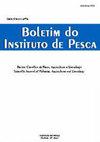ADDITION OF Aurantiochytrium sp. MEAL IN THE DIET AFFECTS IMMUNITY AND THERMAL SHOCK RESISTANCE OF THE PACIFIC WHITE SHRIMP
IF 0.6
4区 农林科学
Q4 FISHERIES
引用次数: 2
Abstract
This paper reports the evaluation of digestibility, immunological parameters, and resistance to thermal shock at low temperature in Litopenaeus vannamei fed diets with diferent Aurantiochytrium sp. meal additions (0; 0.5; 1 and 2%). First, the apparent digestibility coefficient of the ingredient was determined. The digestibility of the microalgae meal was high for protein (74.90%); around 60% for lipids, and for docosahexaenoic fatty acid (DHA) it was 55.61%. After, shrimp rearing with the feed additive was carried out in a clear water system, containing 25 shrimp (initial weight: 4.89 ± 0.27 g) per 400 L tank. Feeding occurred four times a day. After a three-week period, immunological parameters were evaluated and thermal shock was performed. Animals fed 0.5% and 2% of the microalgae Aurantiochytrium sp. showed higher survival to thermal shock. In immunological analyses, the serum agglutiniting titer was higher (p <0.05) in the 0.5 and 2% additions of the microalgae meal, and the phenoloxidase activity (PO) was higher in the 1% addition (p <0.05). It is concluded that there is good utilization of the nutrients of Aurantiochytrium sp. meal by L. vannamei and its addition to the diet (0.5 and 1%) increased shrimp resistance to thermal shock.饲料中添加金虾粉对太平洋白对虾的免疫力和抗热震性有影响
研究了凡纳滨对虾(Litopenaeus vannamei)在饲粮中添加不同的金氧化钇(Aurantiochytrium),对其消化率、免疫参数和低温热休克抗性的影响。0.5;1%和2%)。首先,测定了原料的表观消化率系数。微藻粕对蛋白质的消化率较高(74.90%);脂质约为60%,二十二碳六烯脂肪酸(DHA)为55.61%。随后,在清水系中进行饲料添加剂对虾饲养,每400 L池25只对虾(初始体重:4.89±0.27 g)。每天进食四次。三周后,评估免疫参数并进行热休克。饲喂0.5%和2%的Aurantiochytrium sp.的动物对热休克的存活率较高。免疫分析结果显示,微藻粕添加量为0.5%和2%时血清凝集效价较高(p <0.05),添加量为1%时酚氧化酶活性较高(p <0.05)。综上所述,凡纳滨对虾对黄颡鱼粕中的营养物质有较好的利用,在饲料中添加0.5和1%黄颡鱼粕提高了对虾对热休克的抵抗力。
本文章由计算机程序翻译,如有差异,请以英文原文为准。
求助全文
约1分钟内获得全文
求助全文
来源期刊

Boletim do Instituto de Pesca
FISHERIES-ZOOLOGY
CiteScore
0.80
自引率
0.00%
发文量
24
审稿时长
>12 weeks
期刊介绍:
To publish original articles of research and short communications in the following áreas: Fisheries, Aquaculture, Zootechnology, Limnology, Oceanography, Biology and Pathology of aquatic organisms. The publication depends on the approval of the Editorial Board, based on the peer review.
 求助内容:
求助内容: 应助结果提醒方式:
应助结果提醒方式:


